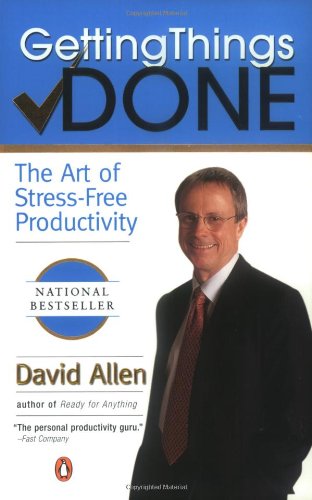
📚 Getting Things Done
by David Allen
is a #productivity system that helps individuals achieve a state of "mind like water," in which they are able to respond flexibly to new tasks and challenges without becoming overwhelmed.
🧵 1
by David Allen
is a #productivity system that helps individuals achieve a state of "mind like water," in which they are able to respond flexibly to new tasks and challenges without becoming overwhelmed.
🧵 1

The book has sold over 1 million copies worldwide since its release in 2001 and it's considered a classic in the productivity and self-help genre.
The key ideas of "Getting Things Done" include:
🧵 2
The key ideas of "Getting Things Done" include:
🧵 2
Capture: Record all tasks, ideas, and information as soon as they come to mind, so that they can be processed and organized later.
Example: Instead of trying to remember to buy milk on the way home, capture the task by writing it down in a shopping list app on your phone.
🧵 3
Example: Instead of trying to remember to buy milk on the way home, capture the task by writing it down in a shopping list app on your phone.
🧵 3
Process: Review the items captured and decide on a course of action for each one, such as delegating, scheduling, or completing the task.
Example: Review the shopping list and decide to delegate the task to your partner to buy milk on their way home.
🧵 4
Example: Review the shopping list and decide to delegate the task to your partner to buy milk on their way home.
🧵 4
Organize: Place tasks and information into a system of folders, lists, and calendars, so that they can be easily accessed and acted upon.
Example: Organize the shopping list into different sections making it easier to find what you're looking for when you need it.
🧵 5
Example: Organize the shopping list into different sections making it easier to find what you're looking for when you need it.
🧵 5
Review: Regularly review the task list, calendar, and folders to ensure that everything is up-to-date and that progress is being made towards goals.
Example: Review the shopping list once a week and cross off items that have been purchased.
🧵 6
Example: Review the shopping list once a week and cross off items that have been purchased.
🧵 6
Do: Take action on the tasks and projects that have been captured, processed, organized, and reviewed.
Example: Take action on the task of buying milk by going to the store and purchasing it.
🧵 7
Example: Take action on the task of buying milk by going to the store and purchasing it.
🧵 7
Natural planning model: Use next actions, projects, waiting for, someday/maybe and areas of focus to organize and prioritize the tasks effectively.
🧵 8
🧵 8
Example: Break down the task of "Buy a new car" into next actions like: research car models, compare prices, test drive and finalize the purchase.
🧵 9
🧵 9
Stress-free productivity: Focus on what can be done now and not dwelling on what can't be done.
Example: Instead of worrying about all the tasks on your to-do list, focus on completing one task at a time, so you can make progress without feeling stressed.
🧵 10
Example: Instead of worrying about all the tasks on your to-do list, focus on completing one task at a time, so you can make progress without feeling stressed.
🧵 10
Work smarter: Productivity is not about working harder but working smarter, by having a clear and organized system in place.
🧵 11
🧵 11
Example: Use the "Getting Things Done" method to prioritize and organize your tasks in a way that allows you to complete them more efficiently, so you can achieve your goals without working harder.
🧵 12
🧵 12
Stress-free productivity: Focus on what can be done now and not dwelling on what can't be done.
🧵 13
🧵 13
Work smarter: Productivity is not about working harder but working smarter, by having a clear and organized system in place.
🧵 14
🧵 14
For example, instead of keeping a to-do list in your head, capture everything that needs to be done in a physical or digital list, then process the list by categorizing them into next actions, projects, waiting for, someday/maybe and areas of focus.
🧵 15
🧵 15
Organize the list by placing each task in the appropriate category, and review it regularly to ensure that everything is up-to-date and that progress is being made towards your goals.
🧵 16
🧵 16
That's a wrap!
If you enjoyed this thread:
1. Follow @1TweetBooks for your daily book summary
2. RT the tweet below to share your latest read
3. Leave a comment with your thoughts on the book!
🧵 17/17
If you enjoyed this thread:
1. Follow @1TweetBooks for your daily book summary
2. RT the tweet below to share your latest read
3. Leave a comment with your thoughts on the book!
🧵 17/17
https://twitter.com/1606476363078279168/status/1616214981665591297
• • •
Missing some Tweet in this thread? You can try to
force a refresh








